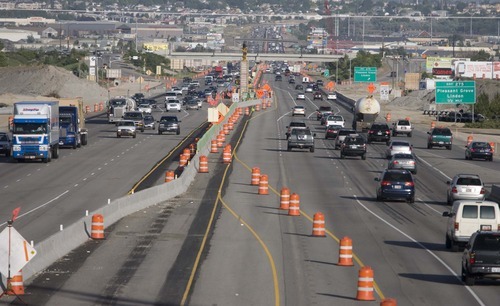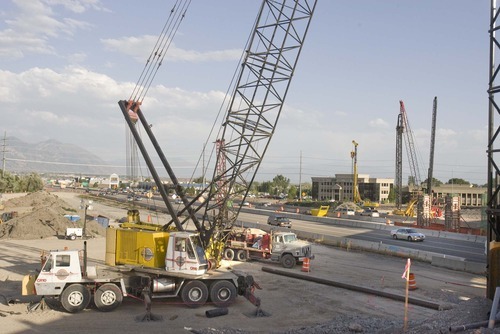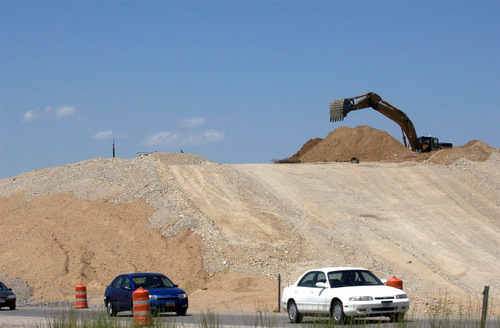This is an archived article that was published on sltrib.com in 2011, and information in the article may be outdated. It is provided only for personal research purposes and may not be reprinted.
A new state audit (http://bit.ly/ferUBE) questions the fairness both of how the Utah Department of Transportation awarded a $1.1 billion contract to rebuild I-15 in Utah County, and the $13 million it later quietly paid to settle with an upset bidder that contended it had been cheated out of the contract.
"Because of subjectivity [of the process] and lack of documentation, we were unable to conclude regarding the actual legitimacy" of the bidding process, state Auditor Auston Johnson wrote. And about what it paid to settle claims of unfairness, he added, "UDOT did not obtain complete and adequate documentation to support the settlement amount."
As an aside, the audit also found that a UDOT manager who was having an affair with the head of one of the bid-winning companies also once awarded him an emergency bridge contract without following normal procedures. That former manager, who was disciplined and put in a different job last year, was not involved in the Utah County 1-15 project, UDOT officials have said.
Gov. Gary Herbert ordered the audit last year during his re-election campaign after the settlement became a big issue in the race.
Provo River Constructors won the I-15 contract after its principals had given $87,500 to Herbert's campaign. A losing bidder, Flatiron/Skanska/Zachry, claimed UDOT tweaked bid scoring to rob it of that contract by one point — and UDOT paid $13 million to settle its claims. That $13 million was supposed to cover the costs the contractor incurred to make its bid.
Among problems with the bidding process, the audit said, is that UDOT "did not 'blind' (conceal the identity of) the contractors submitting the proposals and, as a result, there is the possibility that the proposals might not have been evaluated objectively."
While it said that judging such design-and-build project proposals is subjective, it said UDOT "did not provide adequate documentation to sufficiently support the adjectival ratings and scoring."
The audit also found that UDOT might have given information in meetings with a losing bidder "that was inconsistent" with how it actually scored bids, possibly hurting its chance at the contract.
Additionally, UDOT "did not adequately secure and protect the bid information" because a UDOT employee disclosed bid rankings to an employee at "Wadsworth Brothers Construction, a contractor that is part of Provo River Constructors." UDOT said in written responses to the audit that it "took appropriate disciplinary action" against the offending employee, but did not say what it was.
Also, it noted that a spouse of one technical evaluation team member "was employed by one of the contractors submitting a proposal."
Despite the weaknesses in the process, the audit said that "all [UDOT] evaluators we interviewed indicated that they agreed with the decision to award the contract to Provo River Constructors and that they did not experience undue influence in their decisions."
Meanwhile, the audit said UDOT agreed to pay Flatiron/Skanska/Zachry $13 million to cover its bid preparation costs to avoid litigation over allegations of improprieties. Auditors said UDOT also said it had documentation supporting those costs, but auditors found documentation supporting only $8.6 million in costs.
UDOT defended the decision, however, in a written response to the audit saying it saved far more money than it cost by avoiding delays and allowing the project to move forward speedily. Records the company produced during the course of the audit showed Flatiron/Skanska/Zachry's costs for the bid actually were more than $14.5 million, UDOT said.
The auditor also complained that UDOT failed to recognize and handle some conflicts of interest.
He noted that UDOT's former director of research and bridge operations "had not disclosed her private engineering and consulting company or her personal relationship with a contractor who regularly conducts business with UDOT and submitted a proposal" for the project.
Guy Wadsworth, founder and president of Wadsworth Brothers Construction, earlier apologized publicly for the embarrassment caused by his extramarital relationship with the UDOT employee. UDOT said she was disciplined and demoted.
The audit said it found that same employee once awarded an emergency bridge repair contract to "a particular contractor with whom she was personally involved … without going through the established process" for such bids.
That finding appears to be at odds with a statement that Wadsworth made when he earlier apologized for the affair. He said he and the UDOT employee had not been involved in the I-15 bid process "or any other bid selection procurement process in any manner. Period."
UDOT Executive Director John Njord also said at the time that UDOT may have done more than demote the employee if it had found anything "more than just an inappropriate relationship."
UDOT spokesman Nile Easton said on Monday that UDOT had no evidence that the employee had a relationship with Wadsworth at the time she awarded the emergency contract to his firm. He said evidence it had showed the relationship later, so it is currently not considering any additional disciplinary action.
Mike Mower, deputy chief of staff for Herbert, said, "The governor called for this audit to ensure there was no undue influence with regard to the awarding of the I-15 Core contract, and the audit found absolutely no evidence of undue influence."
He added that Herbert met with Njord to review the audit findings before he departed Friday for a trade trip to China.
"John Njord has discussed with the governor the ways in which UDOT is already implementing the improvements suggested by the audit, and the governor is satisfied that UDOT will see those improvements through to completion," he said.
The Legislature, which was upset at UDOT making the settlement without notifying it or the governor, changed the law during its past session.
The law will force UDOT to obtain permission of the Transportation Commission for any settlements of more than $100,000; permission of the commission and the governor for any above $500,000; and from those two plus legislative leaders for any more than $1 million.
Other state agencies already must inform the Legislature and governor of settlements that top $500,000, but UDOT had, for unknown reasons, been exempted from that law, passed in 1995.







